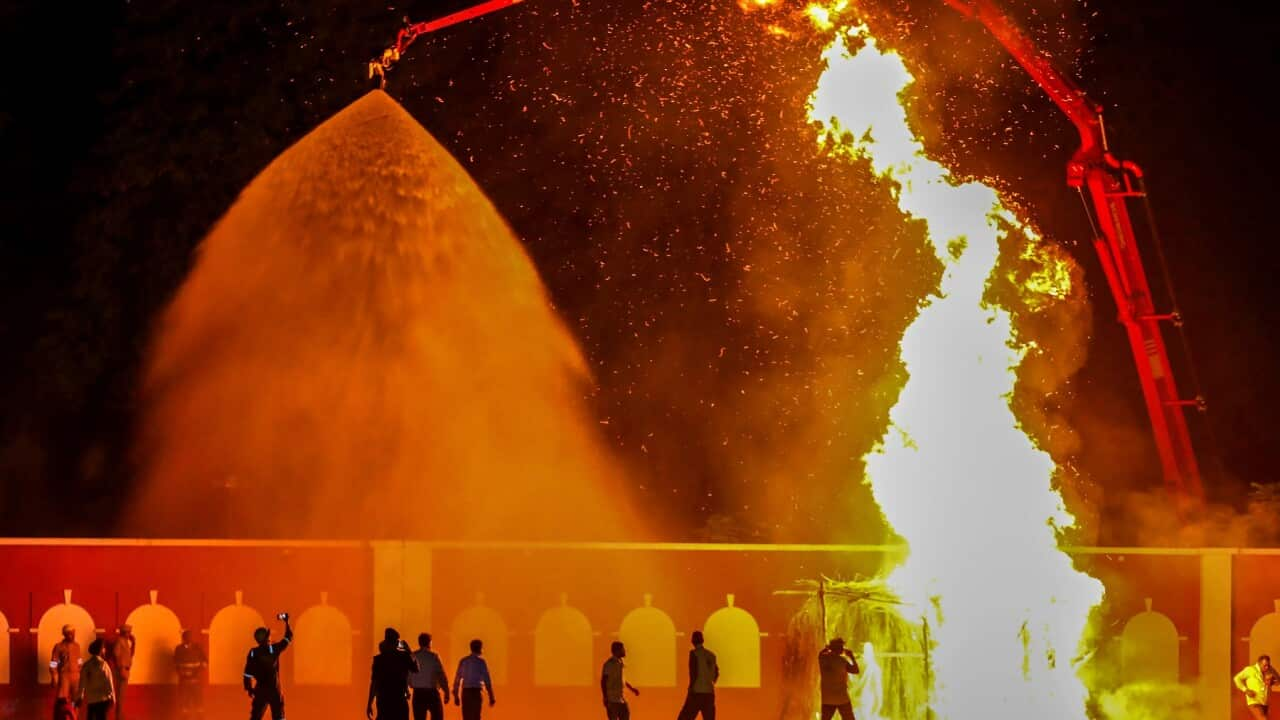TRANSCRIPT
Global leaders are calling for restraint following India's cross border attack on Pakistan on Wednesday that left 31 Pakistani civilians dead and 46 others injured.
Among those calling for calm is British Prime Minister Keir Starmer...
"Rising tensions between India and Pakistan will be of serious concern for many across Britain. We are engaging urgently with both countries, as well as other international partners, encouraging dialogue, de-escalation and the protection of civilians."
... and European Union Foreign Policy Chief Kaja Kallas.
"It is very concerning what is what is happening there (between India and Pakistan), so it is clear that this war is not good for anybody, so we are trying to mediate and bring the tensions down. Of course I condemn terrorism in any shape or form, that is also very clear, but we need to see how we can go from here to bring the tensions down."
In the early hours of Wednesday, just before sunrise local time, missiles struck across parts of Pakistan and Pakistan-administered Kashmir.
Confirmed by India, they targeted what it called terrorist infrastructure, the groups it accuses of carrying out the killing of 26 Hindu tourists in April.
The strikes hit nine sites across the border, including religious schools and buildings allegedly tied to Lashkar-e-Taiba and Jaish-e-Mohammed, militant groups long designated as terrorist organisations by the United Nations and widely believed to operate from Pakistan.
The Pakistani military says at least 26 Pakistani civilians were killed and 46 others injured.
In Bahawalpur, Punjab, an Islamic seminary was reduced to rubble.
Students like Mohammad Zubair had been evacuated just days earlier amid rumours of a strike.
“This is a cowardly action by India. As you know, there are certain rules in war. The worship places, hospitals and educational institutions are not attacked, women and children are not harmed. India is so scared that it attacked innocent students studying in a seminary. I don’t understand why India is so afraid of seminary children.”
Pakistani officials say India's attack is an unprovoked act of war.
Pakistan’s Prime Minister Shehbaz Sharif says his country's response will be appropriate.
“The previous night, India made an offensive mistake, and it will have to bear the repercussions of its actions. Perhaps they thought we would retreat, but they forgot that, by the grace of Allah Almighty, we are a nation of brave people, who are steely in their determination. ... India is a cowardly enemy that believes it is powerful by targeting innocent people. But last night, we showed that, by the grace and mercy of God Almighty, Pakistan knows how to deliver a fitting response in its defence."
Pakistan claims it has shot down five Indian aircraft, though India hasn’t confirmed this.
Witnesses in Indian-administered Kashmir reported wreckage from three jets that fell inside Indian territory.
The crisis marks the worst escalation since 2019, when a similar spiral followed a deadly suicide bombing in Kashmir.
But Walter Ladwig, an associate fellow at King's College, London, says this time, the risks may be greater.
"The optimistic case here, is that the Pakistani military will respond in some way that allows them to defend or restore their honour, but that it goes no further, that there is not a target set or losses inflicted such that the Indian side needs to respond to the response. If the latter happens then we start to get in an upward escalatory spiral where what will the next set of targets be? Because if India attacks terrorist camps, or what it believes are terrorist camps, and Pakistan responds by attacking Indian military targets, even if it's the bases from which those missiles and airstrikes came from, and then India attacks Pakistani military facilities, you can see how this could quickly move us up the threshold of conflict."
Across India, civil defence drills have intensified.
In New Delhi and Hyderabad, authorities are rehearsing for missile strikes, urging civilians to take cover if air raid sirens sound.
India's emergency preparedness operation, code-named Sindoor, is a reference to the red powder worn by married Hindu women, and a reminder of those widowed in last month’s attack.
While India enjoys a larger defence budget, Mr Ladwig says Pakistan’s military modernisation is catching up fast.
"When we're considering just overall the general trajectory of India and Pakistan military modernisation, although Pakistan has a significantly smaller defence budget, one of its huge assets is the fact that its main weapon supplier is China and China delivers. So we've seen modernisation of the Pakistani Air Force in terms of jointly produced and developed fighter jets. And then with respect to the air defence, Pakistan is reported to have gained access to Chinese variants of Russian air defence systems. So something that might be seen as the equivalent of the S-400 system or something kind of comparable to that."
India, by contrast, has struggled with delays in military procurement.
Decades-old Russian tanks remain in service, and long-planned purchases of hundreds of fighter jets have yet to materialise.
Meanwhile, in London, protests erupted outside the Indian High Commission.
Demonstrators warned that continued violence would cost both nations dearly.
"We don't want war, we like peace. Peace, peace, peace. No war, no war, no war."
Naheeda Nasir was among the protestors.
"We want peace. We want the world to know that we want peace, we want to say no for war, because war, we've just been through with Palestine, now this is happening in India and Pakistan, and it's not the loss of one country, it's loss for both countries. And it's all the civilians and innocent people always die between the wars."
But away from the protests, Pakistan’s government has hardened its stance.
The National Security Committee has pledged to retaliate at a time, place and manner of its choosing.
For now, all eyes are on Pakistan.
What it does next could decide whether the region returns to uneasy peace, or slips further into crisis.













